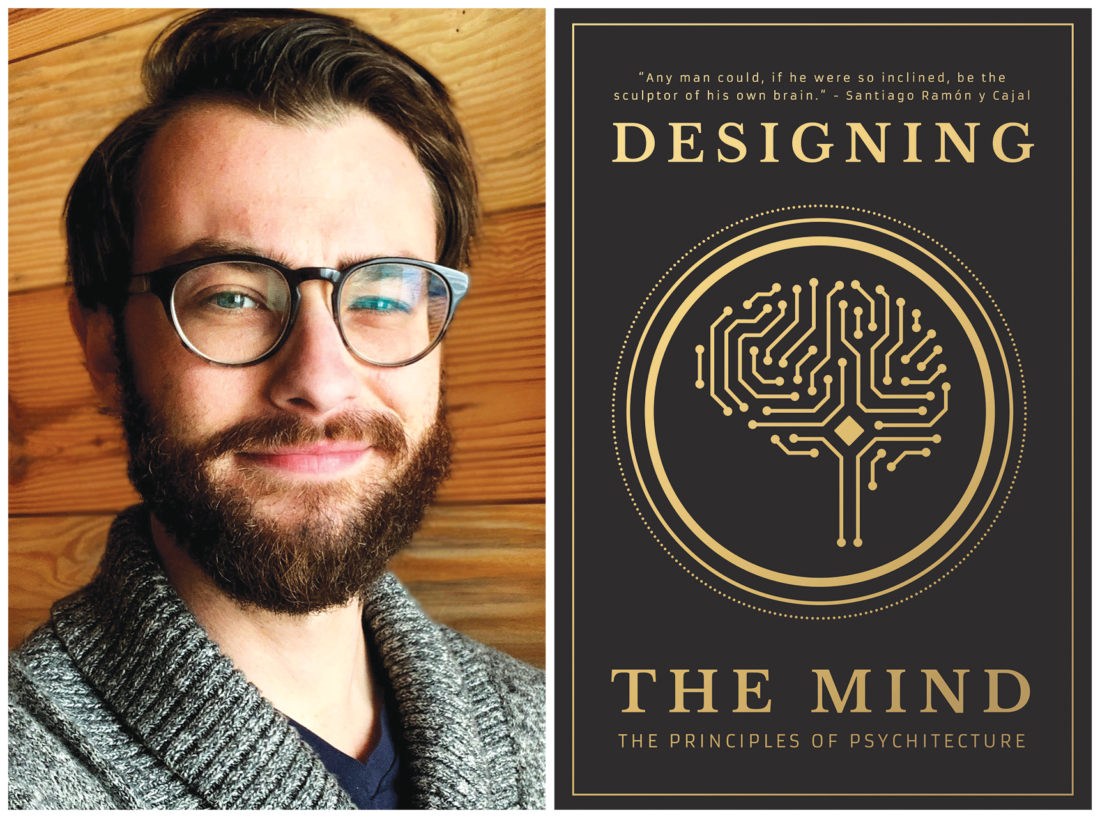Ryan Bush’s new book is “probably not for you” — unless you’re one of the rare few itching to reframe your reactions to everyday life and rebuild your worldview. In that case, Bush is ready to welcome you into his self-crafted mindset of wisdom and well-being.
The Asheville-based author makes that sentiment clear in the opening line of his first full-length publication, Designing the Mind: The Principles of Psychitecture. It’s not a typical self-help book, full of tips to lose weight or advance a stalled career. Nor is it a spiritual guide to unlock the secrets of the human soul.
Instead, Bush’s book builds on the philosophies of Buddhism and Stoicism to describe a system for rewiring the brain’s response to external events, a method Bush dubs “psychitecture.” “I describe it as essentially the act of designing and optimizing one’s own mind,” he explains. “It’s this kind of contrast between the ancient idea that true happiness comes from within [and] the modern, almost futuristic metaphor of the mind as an operating system or a piece of software.”
As a teenager, Bush recalls writing thousands of notes on his cell phone tracking his emotional response to daily events. His obsession with psychology faded briefly as he pursued a degree in industrial design from Auburn University and a series of product design jobs with Western North Carolina technology startups. Over time, he became convinced that the same protocols used by computers to process information could be applied to the human mind.
He points to his own social anxiety as a psychitecture success story: In his youth, Bush frequently thought others perceived him as weird. He started writing down his thoughts, what caused them and any emotions they triggered. A pattern of distorted thinking emerged from those notes, he says, and he gradually began exposing himself to potential triggers, pushing him outside his comfort zone and helping overcome his fears.
This take on cognitive reappraisal, a common approach to cognitive behavior therapy used by psychologists to help control fluctuating emotions, is Bush’s favorite of the many tools he provides for readers to rewire their ways of thinking.
“We have the power to change the way we habitually respond to the things that happen to us, be it anxiety or anger or grief,” Bush says. “For those who really want a rational, philosophical approach to spirituality, who really want to not just get better circumstances in their life, but to really become a better, happier person — that’s who I’m writing for.”
It’s a timely message as the COVID-19 pandemic rages on, throwing any sense of normalcy out the window. One person can’t control the spread of the coronavirus, political conflict or any of the other uncertainties swirling around, Bush argues, but anyone can control their own thoughts and attitudes.
“We have these automatic responses and tendencies to catastrophize and to do everything we can to prevent something from happening, even though a lot of the time all we’re doing is ruminating and causing something bad to happen to us,” he says. “If we try our best to understand how our own thoughts and emotions emerge and actually install these ideas into that cycle so that they disengage, we can break free from these habits of anxiety and worry.”




Before you comment
The comments section is here to provide a platform for civil dialogue on the issues we face together as a local community. Xpress is committed to offering this platform for all voices, but when the tone of the discussion gets nasty or strays off topic, we believe many people choose not to participate. Xpress editors are determined to moderate comments to ensure a constructive interchange is maintained. All comments judged not to be in keeping with the spirit of civil discourse will be removed and repeat violators will be banned. See here for our terms of service. Thank you for being part of this effort to promote respectful discussion.